How the advice of a headmistress shaped the life of a corporate executive turned Central Otago viticulturist
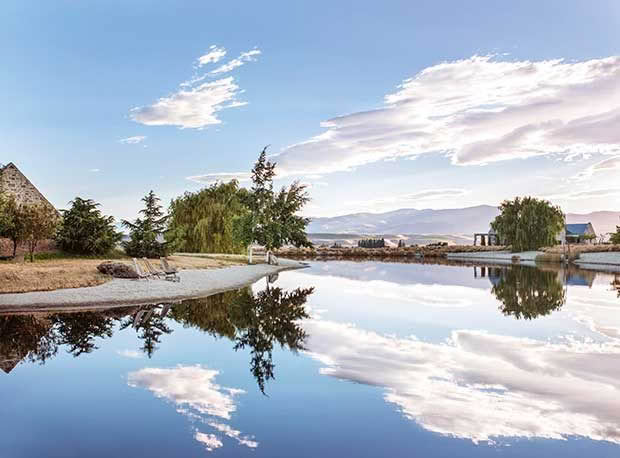
The irrigation pond, separating the house and the barn, is a far cry from a standard water-storage area. The mineral-rich water is good enough to bottle but is used for the grapevines.
Annika Streefland’s dreams of being a botanist stalled when a formidable headmistress gave her a lecture on the value of independence and the perils of being a girl unable to support herself. How thankful she is now.
Words: Kate Coughlan Photos: Rachael McKenna
As she steps outside on an autumn day to work in her vineyard, Annika Streefland wonders how life might have been had she not followed the advice of her straight-talking fourth-form French teacher and headmistress, Sister Celine.
“It was an epiphany. She lectured us girls about how we should be independent and take control of our lives. We were not to blame our backgrounds, let alone our parents (heaven forbid), but to take responsibility, understand money and follow our own path with determination,” recalls this Wellington-based business woman, tango dancer, opera and art lover, and Central Otago vintner.
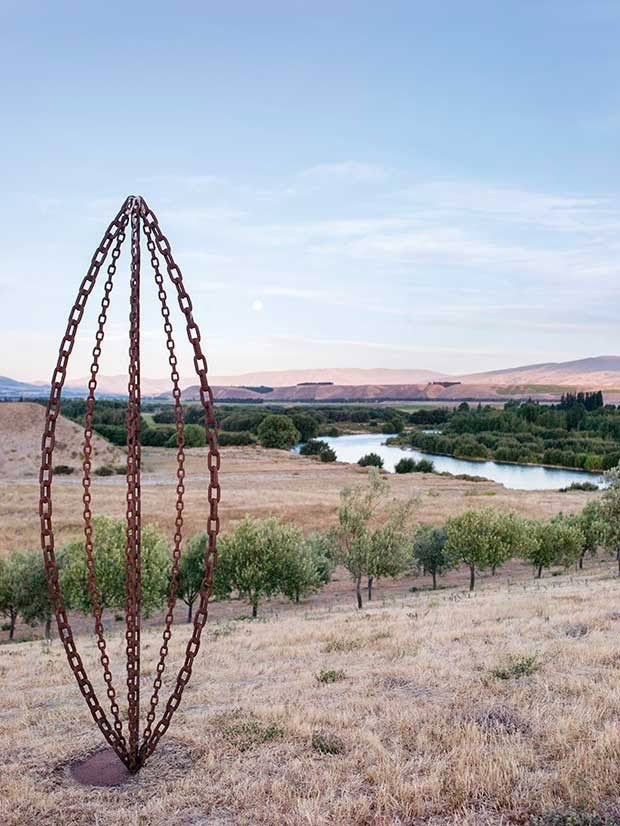
Kopuwai Delta vineyard is situated on a terrace overlooking the Clutha River Mata-au, just at the delta where it runs into Lake Dunstan. The force and magnificence of the river is mesmerizing and the vineyard is named after its taniwha (water spirit) Kopuwai. The Maori legend for Kopuwai is one of power and sometimes menace that one would do well to respect, especially in this basin which has so little rainfall. Nelson sculptor Duncan Leask made the three pod chainlink sculptures that stand quietly in the landscape paying tribute to the taniwha.
“So I took it to heart because, at the time, I deduced, somewhat naively, that this might be the key to happiness.”
Fourteen-year-old Annika immediately dismissed her waffly notions of growing things for a living and swung her focus resolutely in the direction of a more financially stable career. It went well enough that today she can indulge in the pleasure of all the plants she could ever have imagined as a teenage girl.
Maybe her successful career in executive recruitment (becoming one of the youngest partners in the US-based Korn Ferry International), proved the teacher right. It wasn’t her first career choice.
Initially Annika worked for a chartered-accounting firm before realizing it was not for her: accounting for every six minutes of your day is a problem when you’re prone to day dreaming.
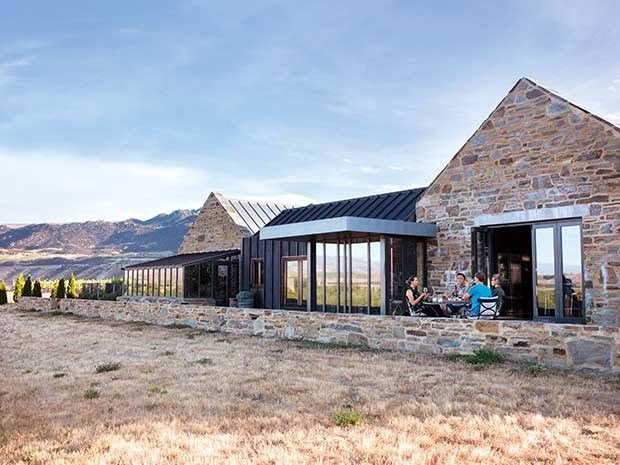
The house was designed by award-winning Custance Associates of Wellington. Annika and Silke grow limes (for G&Ts), tomatoes and basil in the north-facing glass atrium to supplement Silke’s green-fingered exploits in the vegetable beds. Plans for permaculture vegetable beds are developing and will be in by next year.
Her entree to the real world of executive search came with a boutique European firm, H. Neumann Ltd, in her parents’ homeland of the Netherlands.
She was based in Amsterdam before being headhunted by the global company Korn Ferry International. They approached her at just the right time although she wished to be domiciled in New Zealand: “That’s okay,” they said, “You can set up our operationc in New Zealand.” And she did. “
As a team we were passionate about authentic leadership, leaders who knew what they stood for in respect of profit, people and the planet, not just one-dimensional. This led to more creatively diverse appointments, so to that extent we did not have to compete; we were sought out by boards looking for that level of dedication. Finding and encouraging leaders of that quality was deeply motivating.”
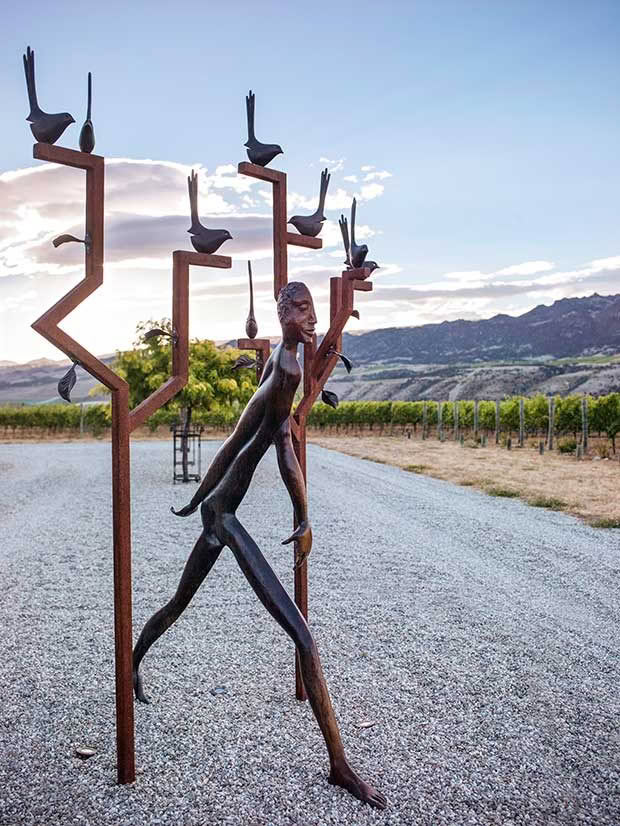
The Paul Dibble sculpture The Watchers overlooks the pinot gris block of Kopuwai Delta vineyard.
One slightly odd thing – and Annika is first to note it – is that she’s not always so keen to heed advice and not everything in her life gets the same systematic and in-depth consideration as that school teacher’s stern warnings. Indeed, the best things happen by instinct without a whole lot of planning – especially when the heart is involved.
Twenty-four hectares of land on the banks of the Clutha River is a case in point. Annika had been looking for somewhere where she could, at long last, get growing. She researched productive land near Nelson and the regions of Mapua and Neudorf shaped up nicely: highly fertile land that was great for aromatic wines, nice climate, and a nearby airport with good connections to her home and work in Wellington.
Nelson also had nostalgic appeal as the town she’d grown up in after her parents settled there in the mid-1950s. “When my father, followed by my mother, arrived in Auckland, it was raining. He went to Wellington; it was raining. ‘Where doesn’t it rain in this country?’ he asked. ‘Nelson’ was the answer – so they moved there.” Nelson was again calling a member of the Streefland family.
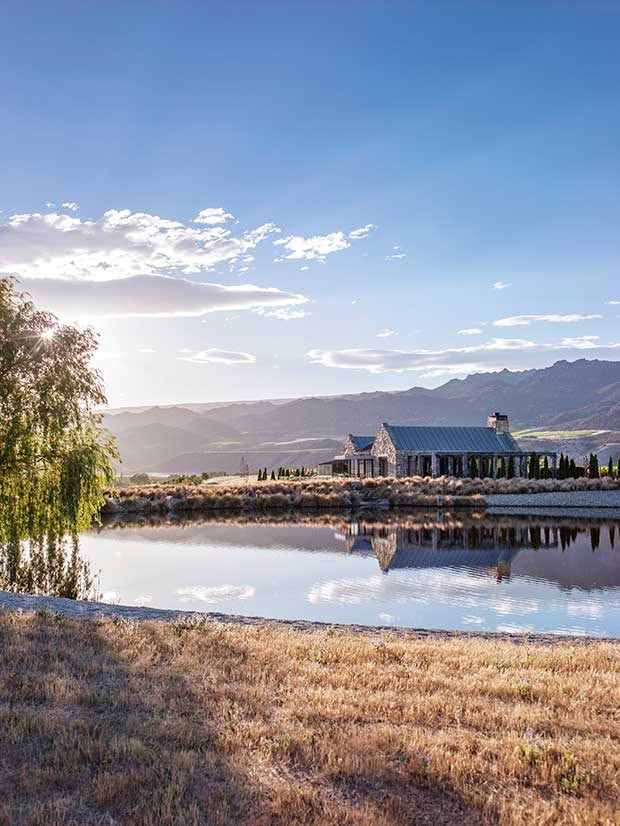
The pond is home to dragon and damselflies which flourish in the ecosystem.
Then, during a road trip through Central Otago in 2002, Annika was intrigued by a For Sale sign on a gravel road. She couldn’t resist moseying down the two ruts of dusty track near Cromwell. At its end was a barren tract of stony terraces beside the Clutha River delta. Not one tree in sight but a million rabbits. This was going to be a whole lot of trouble, but instinct kicked in and within the week Annika was its owner.
“It was at the end of the day when the light turns gold, the Clutha was flowing in a vivid green-blue colour, there were mountains in every direction under a massive sky.”
“So began my love affair with this land and the savage beauty of it all.”
Her first call was to Greg Hay, founder of Peregrine and now Wet Jacket Wines, to seek his views on the land’s suitability for grape vines. He was enthusiastic. This valley was formed through glacial movement (leaving little soil but quartz, alluvial stone and loess) and the long, warm days, cool nights and lack of rain are perfect for cool-climate wines.
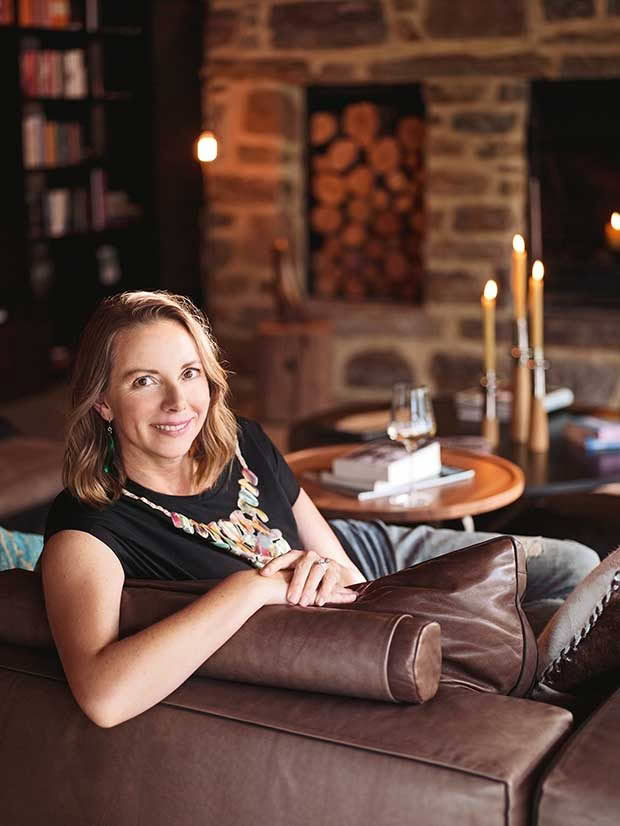
Annika Streefland.
As Annika was already passionate about pinot noir and excited about Central Otago’s prospects for producing internationally significant wines, Greg’s response was all the encouragement she needed. Today she has 11.2ha planted in vines. The newest block – and current time consumer – is a two-year-old three-ha block of close-planted vines.
READ MORE: Learn about the design of Annika Streefland’s home
Initially, and rather optimistically, she set about rabbit-proofing the land then planning the overall layout which today includes vine blocks, an irrigation pond, the house and barn, shelter and beautification plantings, two olive groves and an orchard of fruit and nut trees just for eating.
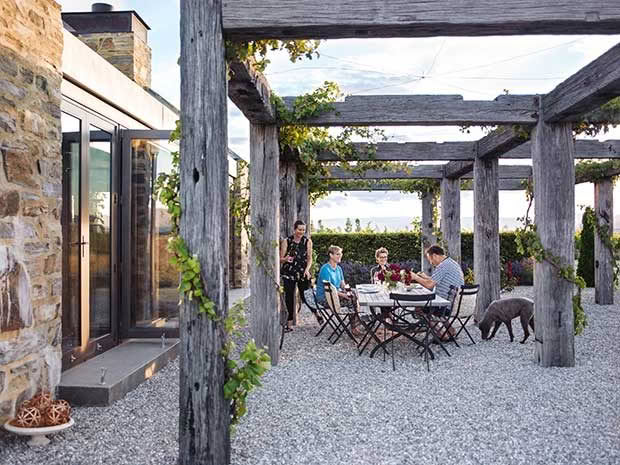
Dining with Nicholas and Fiona beneath the outdoor pergola made from a demolished Southland bridge, with old-fashioned table grape varieties growing their way round it. The planting plan couldn’t be simpler around the house – a few specimen trees, Ingrid Bergman red roses at the end of vines by the house, a hornbeam hedge and lavender.
“My good friend Michelle, long accustomed to my passion for projects, thought I’d really lost all my marbles this time due to he sheer scale and extreme conditions. Fortunately, she kept that thought to herself for the first few years, but it does make us chuckle now.”
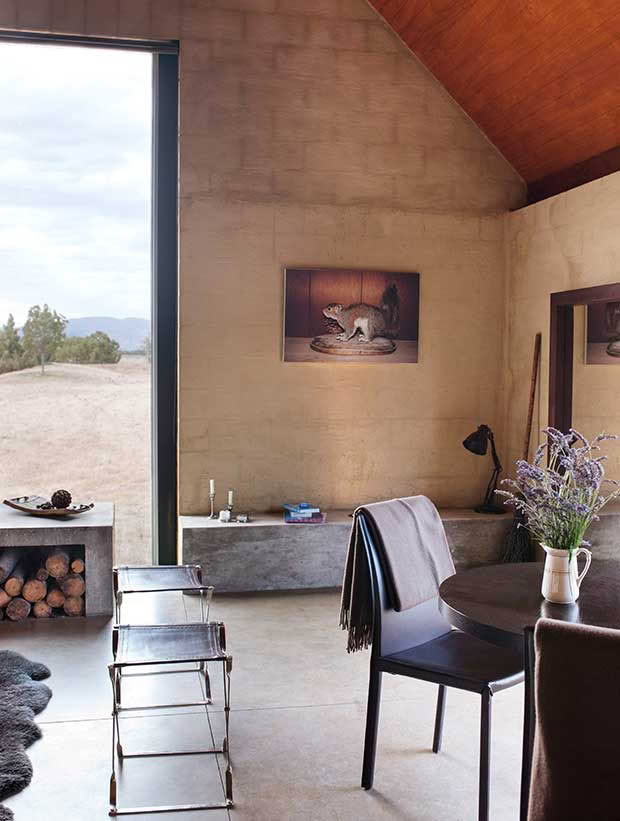
Guests take time out in the romantic, barn-like B&B, a fully contained studio with a cosy open fireplace that connects with the golden palette of the outdoor elements. The quirky squirrel photographic work is by Kathryn McCool.
Looking back Annika can’t decide if the planning or the execution has been her favourite stage of this odyssey. During her busy corporate life – initially consulting as a partner with Korn Ferry for many years and then later at Contact Energy based in Wellington – any bored moments on flights or spare time would be spent doodling on notebooks for layouts, materials and so forth.
She adored all the dreaming and scrawling and plotting and planning.
But, as they say, it’s all in the execution and she has also loved that stage. Building her house was so much fun she’d do it all over again. “It has been a privilege to work with so many wonderful people who specialize in the various components, be it viticulture, irrigation, stone masonry, and eventually the building of a house.”
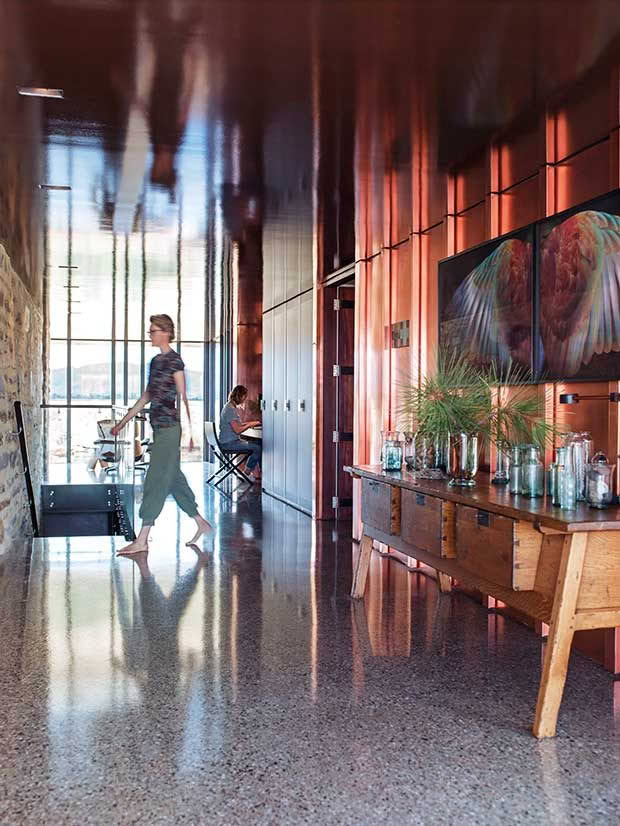
The house is made up of three connected barns, two stone and one copper both inside and out. Hence the reflective copper entrance wall where Fiona Pardington’s kereru wings (native wood pigeon) hangs.
Some of the contractors have been on an equally eye-opening journey as Annika. “The earth-moving bloke who came to create the water storage pond told me: ‘Ponds around here are usually rectangular, lady’.”
That was certainly true but, their imagination captured, they really got into it and much of the contour of the place is a result of their endeavours.
“One day the contractor returned in a truck loaded with spectacular rocks. They’d come off a farm and he brought them for me as a ‘prezzie’ to complete the works. We spent a dusty day placing rocks with the most adroit tractor driver you can imagine.”

Friends help to collect old glass bottles, housing bits and pieces including this vase with stone-pine cuttings.
Annika gives credit too to Sue Mort, a local Englishwoman who helped her make the best of the overall layout and avoid too many tree-planting disasters. “We have a very particular soil and climate which eventually you taste in the bottle and is what makes the wines of this region so beguiling – but other things difficult to grow.”
In the past 16 years, the land has transformed from rabbit-infested and barren to a beautiful property producing pinot noir, pinot gris and chardonnay grapes of flavour significant enough to be sought out by the winemaker at Prophet’s Rock for their fine wines.
The stone buildings either side of the curvy pond and mature plantings of fruit trees (including cherries, apricots, quince, peaches, nectarines, hazelnuts, almonds, walnuts, chestnuts, pine nuts and two olive groves as well as limes in the glasshouse) bring a rare softness to this uncompromising part of Central Otago.
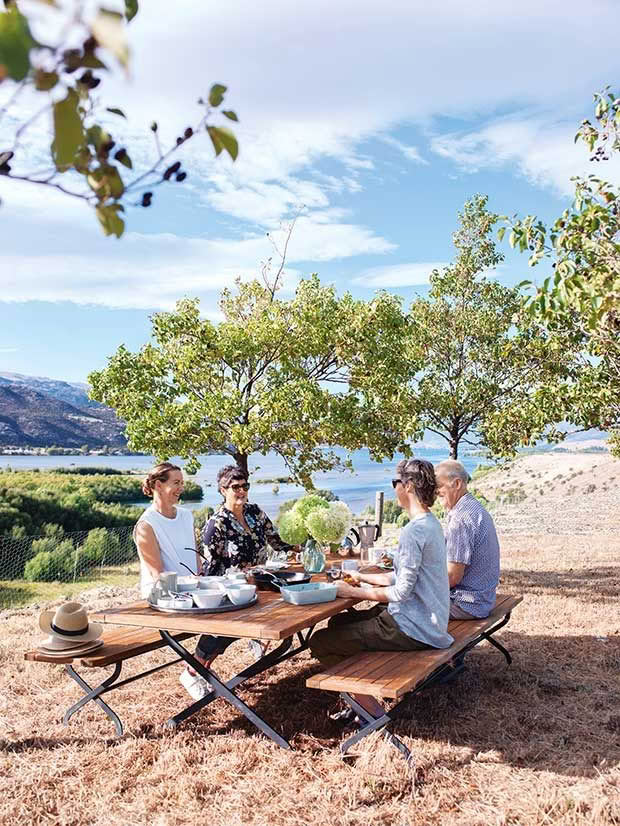
The first (and for years the only) piece of furniture at the property was this picnic table which overlooks the delta, a fine spot for neighbours Nikki and Robin to join Annika and Silke for breakfast.
Silke Radde, Annika’s partner, suggests the pair’s love of tango (that first brought them together) is expressed upon this land. Not even the five blocks of vines form rectangular shapes; they are curved, winding sinuously in a dance across the landscape. In all those years Annika has never, not even for a moment, fallen out of love with her land.
And she has loved being there with Silke.
“It was wonderful to realize just how much Silke, a city Berliner after all, resonated with this landscape, too.”
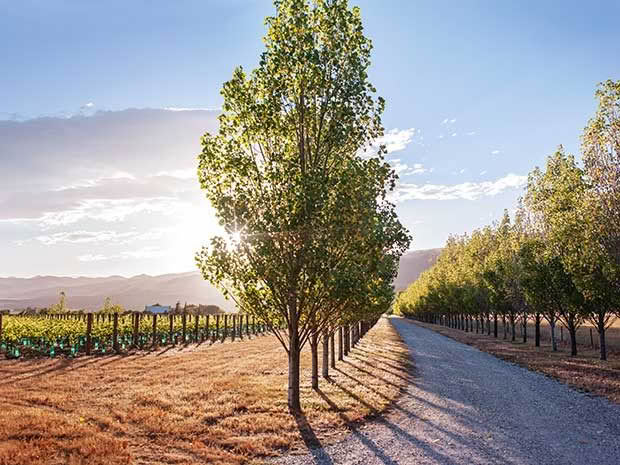
Hardy Veronese poplars line the driveway into the vineyard.
For her part, Silke says she has a sense of belonging here. “When I am on the vineyard I feel a deep sense of oneness, connection with nature, people and myself. For me, life is about being connected.
Being on the vineyard makes me feel alive but insignificant at the same time. The vast skies and wide landscape quickly put you in your place.”
And how well does Annika know this: “When bad weather sets in and the place is more savage than beautiful, the only way to deal with that overwhelmed feeling is to retreat indoors, light the fire, pour a wine and hide on the sofa with a good work of fiction avoiding all reality until I feel brave enough to face it again.”
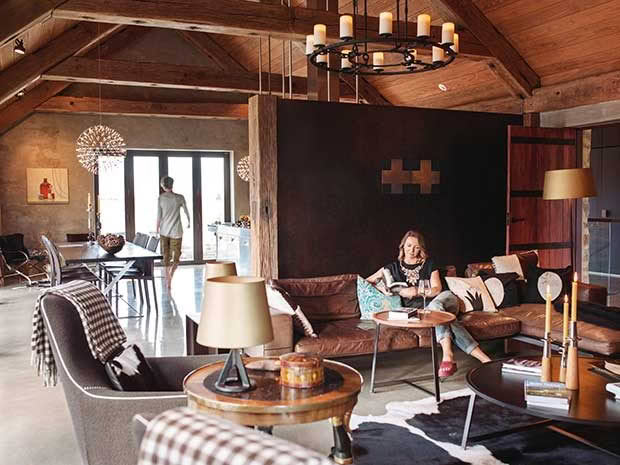
A home-designed iron chandelier hangs above the couch. On the rear wall is a Stephen Bambury diptych.
That remedy remains true although these times are more occasional since the first hard nine yards are now done. Although there’s no doubt the next nine yards will be equally challenging, it’s a challenge shared between two. “Silke brings a unique sensibility to things which gives me more equilibrium – that balance again.”
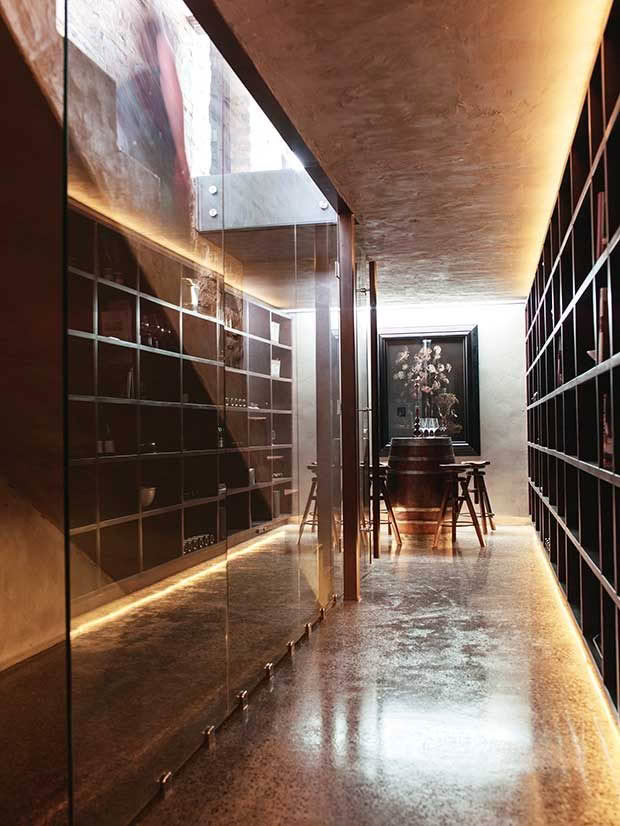
The wine cellar is naturally cooled by virtue of being underground.
In recent times this property and ‘hobby’ has grown bigger than Annika’s day job, and she’s becoming ever-more focused on what they want to achieve. Encouraged by Silke, the day job went – or rather the paid and city-based nature of full-time employment went.
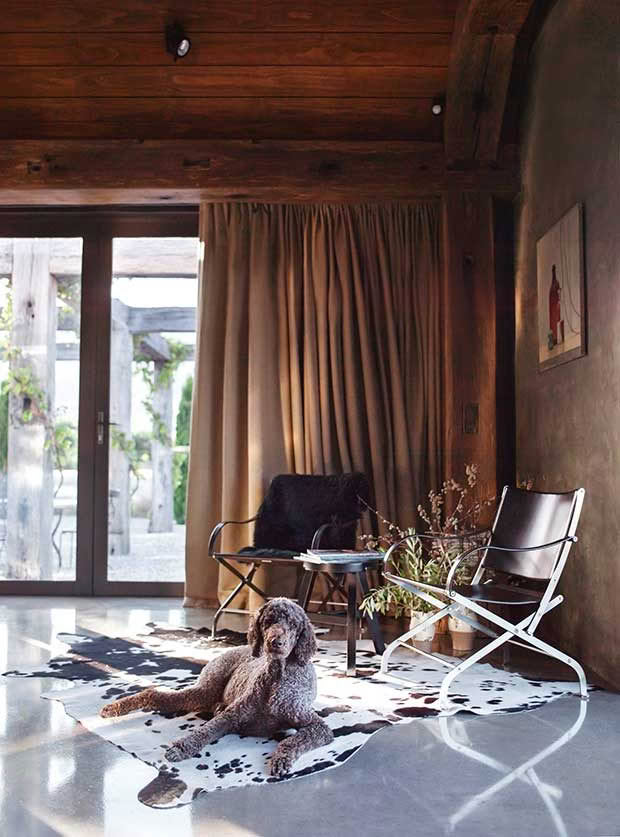
Brix, the poodle, belongs to friends Nicholas and Fiona.
From the outset Annika’s had a 10-year back-of-envelope plan for the vineyard. She says she was about 50 per cent out on the timeframe, partly due to exploring organics, but now’s the time.
“I did not start out with buckets of gold and that’s good because one is more intimately involved this way.”
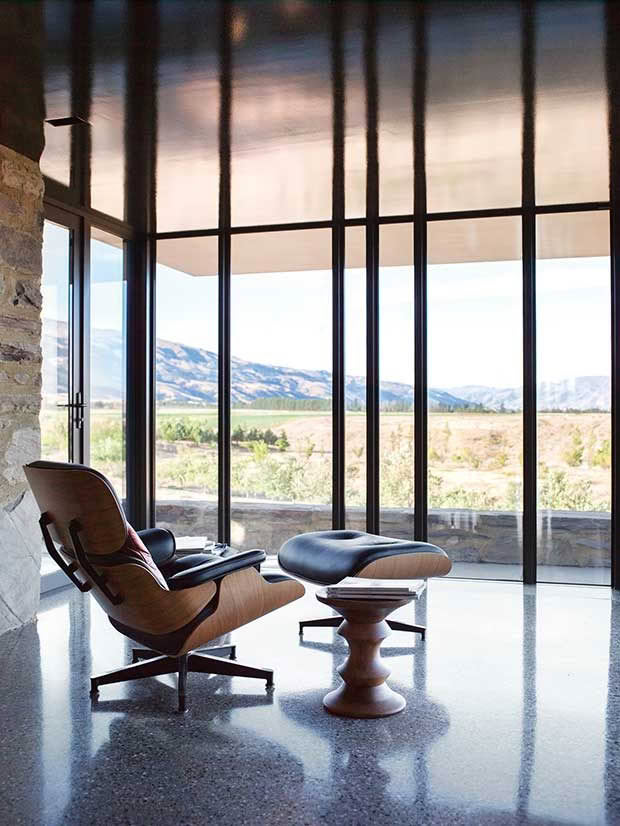
The polished-concrete floor reflects in the bronze-painted ceiling.
Yet more hands-on involvement lies ahead. She and Silke are collaborating with Prophet’s Rock winemaker Paul Pujol to produce a single-vineyard pinot noir, pinot gris and chardonnay under the Prophet’s Rock label. Named Kopuwai after the taniwha that inhabit the river delta, this wine will reflect its unique site.
And, of course, there is a never-ending list of ideas to implement which include a permaculture vegetable garden, a second pond, helping grow the falcon population, perhaps subdividing ‘in’ a section or two and offering bed-and-breakfast accommodation in the stone barn.
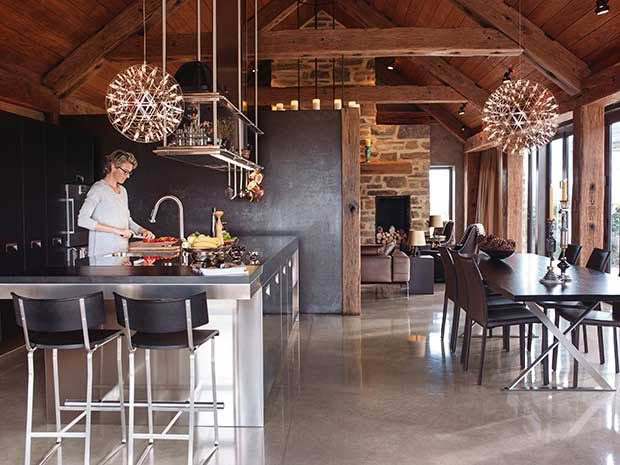
The construction of the house is from local materials where possible including schist stone from Tarras and wooden beams made up from an old demolished bridge in Southland. The house is a design collaboration with designer Jonathan Custance and, from design to build, provided so much fun. The dark rust-coloured steel wall behind Silke separates the dining from the lounge; while two orb lights bring a bit of sparkle to the subdued lighting plan.
Silke still works in Wellington at MBIE and Annika commutes to the city for business commitments but this is their primary home now.
Maybe soon, amid all the planting, growing and building, they’ll find time to get the longed-for dog and enjoy some much-anticipated fly fishing in the big river that endlessly glides past the rows of grapes on the stony terraces.
TANGO: EXPRESSION OF LIFE
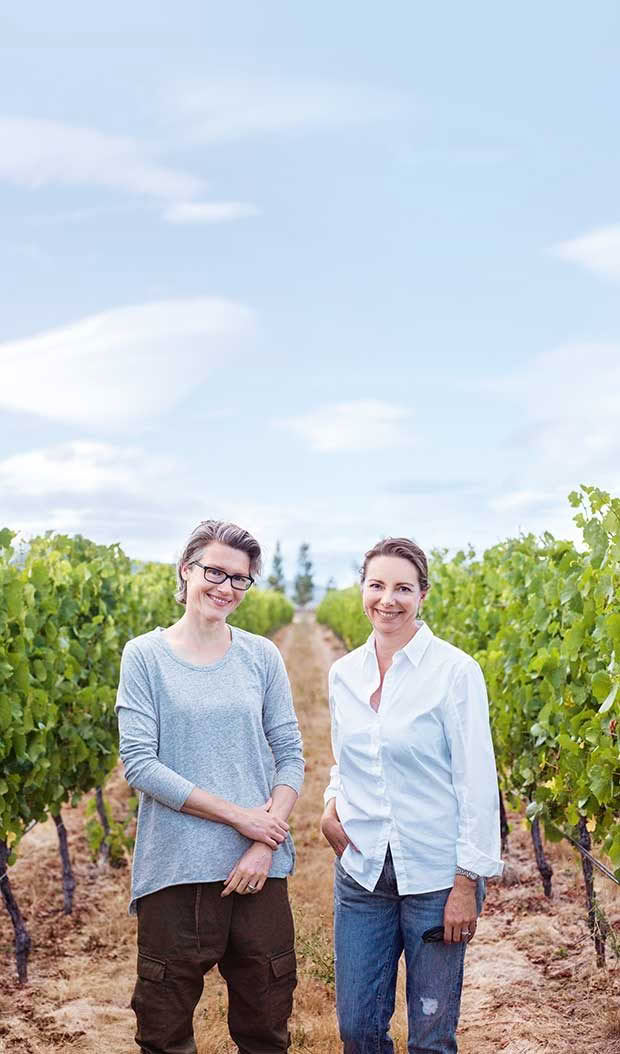
Silke (left) and Annika (right).
“I started learning dancing for the very practical reason that I was falling over a lot and breaking bones. This happened during dangerous activities such as walking to a restaurant – had it been walking home that would have been better no doubt! I needed to regain balance.
I adore music; you’ll always find classical music on here in the morning and jazz after about 4pm so, with this in mind, I started to learn to salsa. While that was fun, I later discovered tango and as most people who dance tango will tell you, it’s somewhat addictive.
It is the ultimate dance; that connection to your dance partner because there are no set steps, just technique and improvisation. You have to read each other to dance together and be right in the moment with the music.
There is a whole international community of tango dancers and you can turn up anywhere in the world to dance and enjoy the same civilized protocol around it.”
And this is where Annika met Silke Radde, a Berliner who’d come to New Zealand in 2000 to complete her Master of Laws and later emigrated.
“When I got to know her I knew we’d be lifelong friends but I didn’t know we were going to be together. I pinched myself for at least the first year.”
Love this story? Subscribe now!
 This article first appeared in NZ Life & Leisure Magazine.
This article first appeared in NZ Life & Leisure Magazine.
